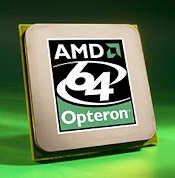 More U.S. computer chips have been sighted in Iran, this time some AMD Opteron Dual Core microprocessors that the Aerospace Research Institute of Iran (“ARI”) touts it has incorporated into what passes for a supercomputer in Iran. The ARI is affiliated with the Iranian government and conducts research on missile technology.
More U.S. computer chips have been sighted in Iran, this time some AMD Opteron Dual Core microprocessors that the Aerospace Research Institute of Iran (“ARI”) touts it has incorporated into what passes for a supercomputer in Iran. The ARI is affiliated with the Iranian government and conducts research on missile technology.
A spokesman for AMD states that he’s “shocked, shocked” to discover that there are AMD chips in Iran. Actually he said that the company complies with all export laws and he has no idea how the company’s chips wound up in Iran, a statement that is likely true in the sense that AMD does not know which of its distributors broke its distribution agreement and sold AMD product to Iran. But generally speaking, AMD, like everyone else, knows how the chips wound up in Iran. The unmentioned two-ton elephant sitting in the corner of the parlor is — are you ready? — named Dubai.
Back in December 2007, this blog reported that Amirkabir University of Technology in Tehran had announced that it had used 218 AMD microprocessors to build what it called a “supercomputer” with a theoretical peak performance of 860 gigaflops. (Real supercomputers measure peak performance in hundreds of teraflops, so this was frankly a rather anemic supercomputer.) AMD issued pretty much the same press release at the time, indicating that it complied with U.S. export laws and had no idea how its chips wound up in Iran.
A little bit of investigation by this blog and we found a picture of Amirkabir assembling the computer complete with pictures of boxes for the AMD chips bearing the logo of Thacker, a company based in — surprise, surprise! — Dubai. Thacker also did its best imitation of Captain Renault and purported to be shocked that its products had wound up just across the Strait of Hormuz in Iran.
This time AMD has indicated that it is going to inform the Bureau of Industry and Security (“BIS”) that it has learned that ARI’s website claimed that it had used AMD chips to build a computer. That is, of course, the right thing for the company to do, but I wonder what such a disclosure is called. It’s not what BIS would normally call a “Voluntary Self Disclosure.” Perhaps we should call it a “Voluntary Somebody Else Disclosure”?
[Hat tip to Patrick Thibodeau at Computer World for breaking this story.]
 Permalink
Permalink
Copyright © 2009 Clif Burns. All Rights Reserved.
(No republication, syndication or use permitted without my consent.)

 Posted by
Posted by  Category:
Category: 

